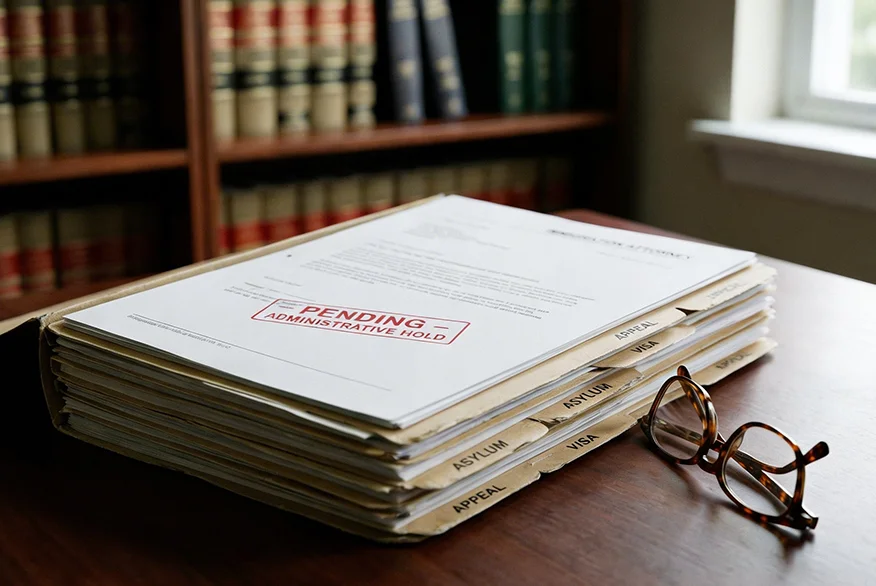Ground of inadmissibility
An individual may be refused entry to the United States due to a finding of “inadmissibility”. Under immigration law, an individual can be found inadmissible on the basis of numerous grounds–including criminal, drug-related, security, medical and immigration violation grounds.
A summary list of the major inadmissibility classifications follows:
- Previous Immigration Fraud
- Previous Deportation or Removal from the U.S.
- Previous Visa Overstays
- Drug abuse, addiction and trafficking
- Physical or mentally disabled individuals that may cause harm to themselves or others
- Alien smuggling
- Security-related
- Public Charge
While some immigrants know that they are inadmissible, others may not. For example, a tourist in the U.S. that overstays their authorized period of admission for 179 days and then returns home, is not inadmissible based on the overstay alone. If that individual had overstayed for 180 days, he or she would have incurred an inadmissibility – namely, a 3-year bar to reentry into the United States.
A waiver may cure certain inadmissibility grounds
Before analyzing possible Waivers and the strength of the Waiver case, it is important to examine whether a Waiver is required under the law. Sometimes, a careful review of the underlying circumstances yields the finding that Waiver is not necessary in the first place. For example, a medical assessment may have been incorrect, or an immigration officer’s decision to ask for a Waiver might have been improper.
In situations where an immigrant does fall into one of the categories of inadmissibility, he or she will not be absolutely barred from getting a Green Card or otherwise entering the U.S. if a Waiver is approved – meaning that immigration authorities overlook the past problem and admit the applicant despite it. The strength of the Waiver typically rests on the strength of the hardship that a “qualifying relative” in the U.S. would experience if their immigrant relative is not permitted to stay in or enter the U.S. Among the waiver requirements is a very specific requirement as to which family members can act as a qualifying relative.
Common Waivers
- Immigration Misrepresentation: Foreign nationals accused of immigration fraud require a Waiver for admission to the U.S., otherwise they face a lifetime ban. In order to qualify to file such a waiver, a qualifying relative (U.S. citizen or lawful permanent resident spouse or parent) is necessary. In order to be approved, a showing of extreme hardship to the relative must be proven. Note that no waiver is available for certain false claims to U.S. citizenship.
- Criminal Inadmissibility: An immigrant denied admission to the U.S. due to a criminal history may have certain qualifying crimes waived – including prostitution, crimes of moral turpitude, and some marijuana crimes. Waivers for aggravated felonies, torture, murder and most controlled substance violations are not permitted. A qualifying waiver based on criminal grounds is possible if it can be proven that a citizen or resident spouse, child or parent will experience extreme hardship if the immigrant is not admitted to the U.S. A waiver under certain circumstances is also possible if over 15 years have passed since the crime was committed, the applicant is rehabilitated and poses no threat to the U.S. if admitted.
- Unlawful Presence: If an immigrant was previously in the U.S. in an unauthorized status for over 180 days and then departs, he or she accrued a 3 or 10-year bar to reentry. The “unlawful presence” waiver is the most common type of waiver that our firm prepares. The waiver applicant must have a qualifying relative, defined as the immigration applicant’s U.S. citizen or permanent resident spouse or parent. NOTE: see explanation of the Provisional Waiver program, below for certain instances in which the unlawful presence Waiver packet can be filed prior to departing the U.S.
Defining extreme hardship
Meeting the “extreme hardship” standard is the key to a successful waiver. Extreme hardship is not specifically defined in immigration law, but a flexible definition has emerged through case law and other guidance. The level of hardship that must be shown is greater than the normal hardship a qualifying relative can be expected to experience if an immigrant applicant is deemed ineligible to immigrate. For example, the mere loss of current employment, the inability to maintain one’s present standard of living or to pursue a chosen profession, separation of a family member, or cultural readjustment do not constitute extreme hardship.
According to the Board of Immigration Appeals (BIA), the following facts are relevant in judging extreme hardship:
- Presence of lawful permanent resident or U.S. citizen family ties to the U.S.;
- Qualifying relative’s family ties outside the United States;
- Conditions in the country or countries to which the qualifying relative would relocate and the extent of the qualifying relative’s ties to such countries;
- Financial impact of departure from the U.S.; and
- Significant conditions of health, particularly when tied to an unavailability of suitable medical care in the country to which the qualifying relative would relocate.
Proving extreme hardship is extremely fact-sensitive and particular to each person and family. An in-depth inquiry into the lives of the applicant and the qualifying family member is needed to understand the chances in a given inadmissibility situation. For an evaluation and assistance in preparing a comprehensive Waiver Package, schedule a consultation to speak with an experienced immigration attorney about the case.
Provisional Waiver (I-601A)
Individuals that have accrued over 180 days of unlawful presence in the U.S. and would incur the 3 or 10-year bar upon departing the U.S. have a new option, as of March 4, 2013. On that date, the new Provisional Waiver program went into effect, allowing qualifying applicants for an unlawful presence waiver to submit their waiver in the U.S., and then depart the U.S. knowing that their waiver has granted.
This new procedure reduces the risk that such an applicant would travel abroad for an embassy interview, only to be denied the waiver and be stuck there for 3 or 10 years. Applicants whose waivers are approved under this program will most likely spend only a few days to a few weeks abroad instead of many months. Eligibility for the program is limited to people meeting the following primary criteria:
- The only inadmissibility is unlawful presence
- The Waiver applicant is the beneficiary of an approved immigrant visa petition filed by a spouse, child, or – if the applicant is under 21 – parent of the child.
- The qualifying relative is a citizen spouse or parent.
- The applicant is present in the US at the time the waiver application is filed
- The applicant either has never been in removal proceedings, or the proceedings are closed.
Assuming the Waiver is approved, the applicant attends a visa interview in his or her home country and is issued an immigrant visa. Whether one qualifies for this program should be carefully examined, as the program all but eliminates family separation for the majority of applicants. Note, this program has been criticized as failing to meet its original purpose as unduly harsh adjudication techniques have neutralized some of the positive effects of the program. For this reason, and the inherent difficulty of a waiver to begin with, a detailed and complete evaluation of each case is critical.






